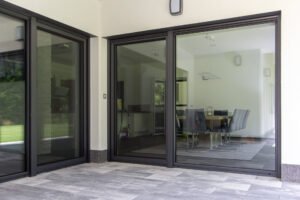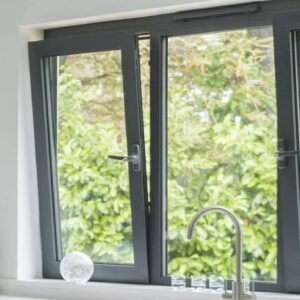Windows play a crucial role in the overall architectural design of a home, providing not only aesthetic appeal but also enhancing the functionality and energy efficiency of living spaces. When considering the installation or replacement of windows, homeowners are faced with numerous material options, notably aluminum and vinyl windows. Each type of window material has its own set of characteristics, advantages, and disadvantages that are essential for homeowners to understand before making a decision.
Aluminum windows are well-regarded for their strength and durability. They can withstand various weather conditions and require minimal maintenance over their lifespan. Additionally, they have a sleek appearance that makes them popular in modern architectural designs. On the other hand, vinyl windows are known for their outstanding thermal performance and energy efficiency. Made from polyvinyl chloride (PVC), they have excellent insulating properties, which can lead to lower energy bills and greater comfort within the home.
The selection of the right window material is an important consideration for homeowners, as the choice can significantly impact energy efficiency, aesthetics, and long-term durability. Windows contribute to a home’s insulation, contributing to a comfortable indoor climate. Factors such as thermal breaks and glazing options further enhance the performance offered by different window materials. Thus, understanding the distinctions between aluminum and vinyl windows is vital for homeowners seeking to optimize their living environment.
This introductory section serves as a foundation for the subsequent comparison between aluminum and vinyl windows, highlighting their respective benefits and drawbacks. Homeowners need to evaluate their specific needs, budget constraints, and aesthetic preferences, enabling them to make an informed decision for their homes.
Benefits of Aluminum Windows
Aluminum windows offer a range of unique advantages that make them an appealing choice for many homeowners. One of the primary benefits of aluminum windows is their exceptional strength and durability. Unlike other materials, aluminum can withstand harsh weather conditions without warping, cracking, or fading, making it an ideal option for various climates. This resilience ensures that aluminum windows maintain their structural integrity and aesthetic appeal over time.
Another significant advantage is the design flexibility that aluminum frames provide. Aluminum can support larger glass panes, allowing for expansive views and more natural light to enter the home. This capability not only enhances the aesthetic appeal of a space but also fosters a sense of openness and connection with the outdoor environment. Homeowners can choose from a variety of finishes and colors that suit their preferences, further increasing the versatility of aluminum windows in diverse architectural styles.
In terms of maintenance, aluminum windows are notably low-maintenance. They do not require painting, and a simple periodic cleaning is sufficient to keep them looking pristine. This makes them a practical choice for homeowners with busy lifestyles, as they do not demand the same level of upkeep as wood windows, which may require regular staining or sealing to prevent damage. Furthermore, aluminum windows have a long lifespan, often lasting over 30 years, making them a worthwhile investment for homeowners looking for durability and longevity.
Moreover, advancements in modern aluminum window technology have introduced thermal breaks, enhancing energy efficiency by reducing heat transfer. This improvement allows homeowners to enjoy both the aesthetic and functional benefits of aluminum windows while contributing to overall energy savings. In conclusion, the combination of strength, design flexibility, low maintenance, and longevity establishes aluminum windows as a reliable option for many residential applications.
Advantages of Vinyl Windows
Vinyl windows have gained popularity among homeowners due to their numerous advantages, which primarily include energy efficiency, cost-effectiveness, and minimal maintenance requirements. One of the most significant benefits of vinyl windows is their exceptional insulation properties, which contribute to a more comfortable indoor environment. The multi-chambered frames of vinyl windows help reduce heat transfer, maintaining a consistent temperature throughout the year. As a result, homeowners can experience significant energy savings, reducing their heating and cooling expenses in the long run.
Cost is a crucial factor when considering window options, and vinyl windows typically come at a more affordable price compared to their aluminum counterparts. This affordability makes them an attractive choice for those looking to enhance their homes without breaking the bank. Additionally, the lower overall lifecycle costs associated with vinyl windows, including reduced energy bills and less frequent replacement needs, further solidifies their appeal.
Another compelling aspect of vinyl windows is their low maintenance needs. Unlike wood or aluminum windows, which may require regular painting or staining, vinyl windows maintain their appearance without extensive upkeep. They are resistant to fading, chipping, and warping, thus ensuring that they can withstand various weather conditions and remain visually appealing for years to come.
From an aesthetic standpoint, vinyl windows offer a variety of styles and colors, allowing homeowners to select options that complement their existing architecture. The customizability of vinyl windows makes them a versatile choice for different home designs while still providing a robust performance. Given these advantages, it is clear why many homeowners gravitate towards vinyl windows when making decisions about home improvements.
Making the Right Choice: Aluminum vs Vinyl
Choosing between aluminum and vinyl windows for your home requires careful consideration of various factors, including budget, climate, aesthetics, and longevity. Each window type has its advantages and drawbacks, impacting your final decision.
Budget is often a primary concern when selecting windows. Typically, vinyl windows are more cost-effective than aluminum options. Because of their lower initial investment, many homeowners opt for vinyl, especially if they are working with a tight budget. However, it is essential to consider long-term costs such as maintenance and replacement, as aluminum windows may offer better durability and fewer repairs over time.
Climate plays a significant role in the suitability of window materials. Aluminum windows are more resistant to extreme weather conditions and are less likely to warp or expand, making them ideal for areas with fluctuating temperatures. On the other hand, vinyl windows provide excellent thermal insulation and are better suited for moderate climates where energy efficiency is a priority. Therefore, assessing your local climate can help guide your choice.
Aesthetics is another important factor to ponder. Aluminum windows can offer a sleek, modern look with thinner frames, allowing for larger panes of glass. This can enhance natural light and provide unobstructed views. Conversely, vinyl windows come in various styles and colors, enabling customization to match your home’s exterior. Depending on your design preferences, one material may appeal more than the other.
When considering longevity, aluminum windows usually outlast vinyl alternatives. While both options have warranties, aluminum’s resistance to elements typically results in lasting performance and less frequent replacements. Consulting with professionals in window installation can provide valuable insights tailored to your specific situation, helping you weigh the pros and cons of aluminum versus vinyl based on your unique circumstances.




1 comment